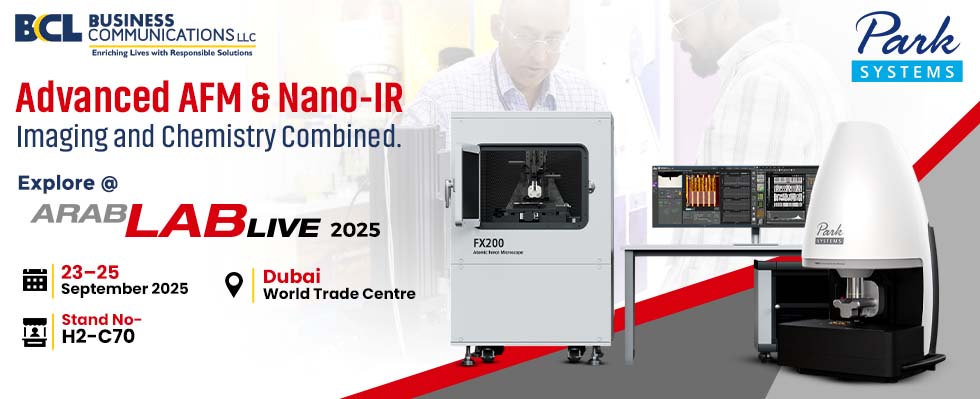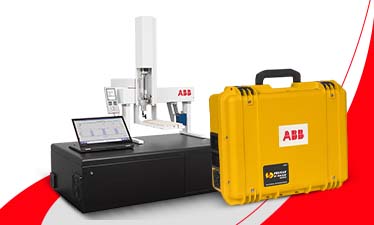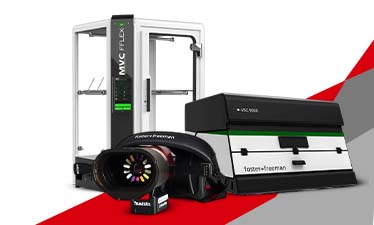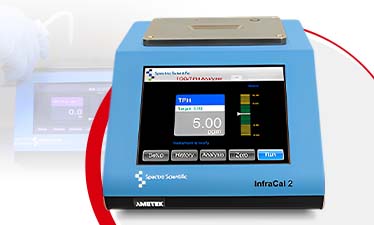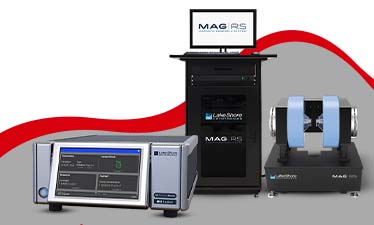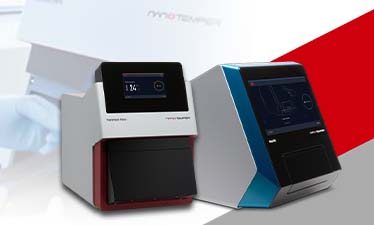Pioneering Nanoscale Analysis: Park Systems With BCL At ArabLab 2025
From 23–25 September 2025, the Dubai World Trade Centre will host the ArabLab Exhibition, a focal point for laboratories across the Middle East. We at BCL are arriving at ArabLab with Park Systems, recognised as the global leader in atomic force microscopy with a 20.61% market share in 2023. Their sustained growth, marked by a 30% CAGR between 2015 and 2022, has kept them ahead in a field where demand for compact and advanced AFM solutions is accelerating across GCC nations.
Small Sample AFM: Compact Access to High-Resolution Imaging
For researchers handling samples below 100 mm × 100 mm, Small Sample AFM microscopes combine ease of use with Park’s hallmark non-contact imaging. These systems simplify preparation, deliver sub-nanometer resolution and remain invaluable for materials science and nanoelectronics.
- True Non-Contact Mode™ avoids probe wear and sample damage
- Integrated optical microscopy enhances usability
- Compact format supports labs with limited bench space
The timing is right: the microscopy market in the Middle East and Africa was valued at USD 261 million in 2024, with demand rising as universities and R&D facilities expand their nanoelectronics and biomedical capabilities.
Large Sample AFM: Meeting Semiconductor Complexity
As microchips shrink and 3D devices increase in complexity, large atomic microscopes have become indispensable. Park’s large-sample systems automate wafer analysis and defect detection, helping semiconductor plants achieve higher throughput with greater reliability.
- Supports wafers and large devices
- High-resolution imaging with automation
- Crucial for next-generation semiconductor inspection
With the global semiconductor metrology market projected to climb from USD 11.52 billion in 2025 to USD 19.8 billion by 2033, demand for AFM-driven nanoscale inspection tools is intensifying. This growth is mirrored by GCC investment in microelectronics hubs, which require systems like Park’s large AFMs to sustain quality at production scale.
Specialised AFM: Designed for Unique Research Needs
Not every experiment fits a standard format. Special AFM microscopes from Park Systems adapt to electrochemical studies, in-liquid biological imaging or high-vacuum environments.
Examples include:
- Electrochemical AFM for studying batteries and corrosion
- In-liquid AFM for live-cell and protein analysis
- High-vacuum AFM for thin films and semiconductor research
The global life sciences microscopy market is forecasted to expand from USD 3.71 billion in 2025 to USD 5.53 billion by 2034 at 4.55% CAGR, reflecting the scale of biomedical research that specialised AFMs now support. Within the Middle East, healthcare infrastructure expansion is accelerating adoption, especially in Saudi Arabia and the UAE.
Park nano-IR Spectroscopy: Chemical Characterisation at the Nanoscale
Beyond imaging, Park’s nano-IR spectroscope integrates AFM with infrared spectroscopy to enable nanoscale chemical mapping. By combining PiFM technology with AFM, researchers can observe not only topography but also molecular composition.
- Correlates surface structures with chemical fingerprints
- Advances studies in polymers, composites and thin films
- Opens new avenues for multidisciplinary nanoscience
This capability arrives as the global AFM market, valued at USD 1.15 billion in 2024, is projected to reach USD 1.88 billion by 2033 at 5.6% CAGR. Growth is particularly strong in regions prioritising nanotechnology research, with GCC countries funding new infrastructure to meet this need.
Park Systems Portfolio In A Nutshell
| AFM Solution |
Distinct Advantage |
Key Application |
| Small Sample AFM |
Compact, high-resolution imaging |
Materials science, nanoelectronics, biosamples |
| Large Sample AFM |
Automated wafer and device metrology |
Semiconductor inspection, defect detection |
| Specialised AFM |
Electrochemical, liquid or vacuum environments |
Energy storage, life sciences, thin films |
| Park nano-IR |
AFM with IR spectroscopy |
Chemical and structural nanoscale analysis |
What ArabLab 2025 Has In Store For You?
The Middle East laboratory equipment market, valued at USD 1.38 billion in 2025, is forecasted to reach USD 2.55 billion by 2033 at nearly 8% CAGR. This growth is fuelled by government investment in healthcare, biotechnology and semiconductor R&D. In such a climate, compact and advanced AFM technology has become indispensable.
The ArabLab 2025 Exhibition will be witnessing a diverse range of lab technologies, and Park Systems stands out by combining market leadership with innovation. As GCC countries expand nanoscale research capacity, Park’s AFMs are set to play a central role in supporting breakthroughs across materials science, life sciences and electronics.
We at BCL will be eagerly awaiting your presence at the event. Mark your calendar today and get ready to witness innovation up close.
Dubai World Trade Centre
23–25 September 2025
Stall No: H2–C70



